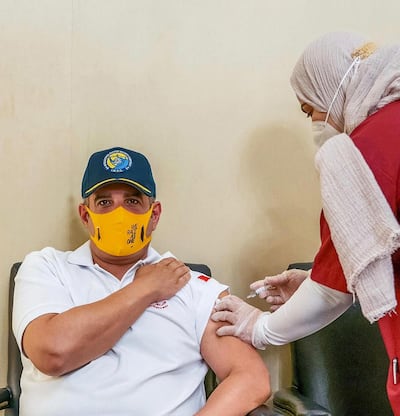New 5G networks in Bahrain are helping the island state take on the global pandemic, with technology at the heart of a multiple-choice vaccination drive.
The nation’s 1.7 million population are among the first to benefit from lightning-fast internet speeds – and it is being put to good use in the fight against Covid-19.
From booking vaccine appointments and collecting virus data to the latest innovations to safeguard communities, national 5G coverage is playing its part.
Health authorities are offering residents a choice of vaccine, and aim to inoculate 5,000 every day. So far, more than 100,000 people have received inoculations.
“Rapid access to information is essential to innovation, particularly for next-generation services,” said Kamal bin Ahmed Mohamed, Bahrain’s Minister of Transportation and Telecommunications.
“Our potential to generate, use, and ultimately export innovation will be pivotal for the growth and diversification of our economy.”
Bahrain was one of the first countries to deliver PCR test results via WhatsApp and Facebook Messenger, while a chatbot delivered the latest pandemic information and direct links to YouTube guidance videos.
Bahrain is third on a global list of vaccine roll-outs, behind Israel and the UAE.
Residents have a choice of either the US-made Pfizer-BioNTech vaccine or the Chinese-made Sinopharm – the two vaccines available in the UAE.
Anecdotally, more people are taking Sinopharm because it is readily available at every clinic in the country. The Pfizer-BioNTech vaccine is available only at the King Hamed University Hospital.

Users of Bahrain’s government health app must fill in personal details to access a free appointment within days, followed by a second dose three weeks later.
Arrangements for others can also be made via the BeAware app, such as the elderly or those without smart devices, while mobile vaccination units are used to reach those in remote areas.
The approach is different to many other countries where only high-risk individuals can currently book appointments, or citizens are contacted by officials with pre-arranged times.
Last year, the kingdom made available a rapid testing service capable of diagnosing Covid-19 in just 15 minutes, without the need for a special laboratory.
In a similar campaign to the UAE, mass population testing and the construction of field hospitals rapidly developed at the height of the pandemic.
Public buses were converted into mobile testing units and residents summoned for tests at random.
Other early interventions included screenings at entry points and restrictions on travel from high-risk areas.
Everyone was tested on arrival, with a second test required within 10 days to give authorities data on how the virus was progressing in the country.
All confirmed cases are quarantined and treated, with those unable to maintain social distancing at home accommodated in quarantine centres.
Of the kingdom’s 100,000 cases, 96,000 have recovered with just 369 deaths.
Daily cases peaked in mid-September with 841, and while numbers steadily declined, in a similar trend to elsewhere in the region, numbers recently began to climb.
On January 26, 459 cases were reported, compared with just 114 on November 22.
As well as a high-speed vaccine booking process, other benefits from 5G are likely to be seen in content development, artificial intelligence, the internet of things and machine-to-machine communications.
An autonomous robot emitting UV light was used in the summer to disinfect public spaces and offices in the country.
The machine used short-wavelength UV to kill traces of the Sars-CoV-2 virus by disrupting its DNA in a process known as ultraviolet germicidal irradiation.
Developed by innovation academy Fab Lab Bahrain, the robot was filmed moving between desks in offices, sterilising work stations as it went.
At the time of its launch, the Ministry of Health’s undersecretary Dr Waleed Al Manea, said the technology would revolutionise the nation’s medical response to Covid-19.
“We started using the robots in the isolation and treatment facilities as part of the experimental phase to use AI in the health sector,” he said.
“It is certainly a new medical revolution and we want to see how this benefits patients and staff.
“This new technology will help doctors and nurses because they can evaluate the effectiveness of the robots and help incorporate them in their daily work.”


